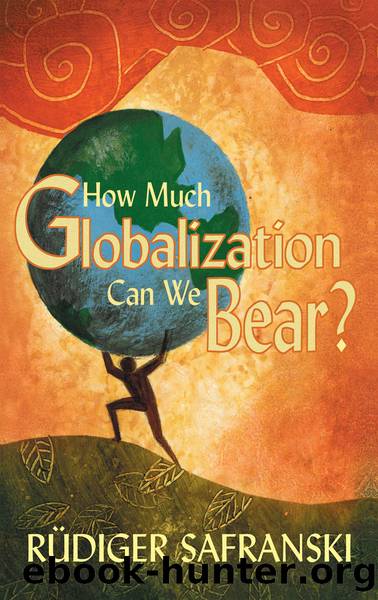How Much Globalization Can We Bear? by Safranski Rüdiger. Camiller Patrick

Author:Safranski, Rüdiger.,Camiller, Patrick.
Language: eng
Format: mobi
Publisher: John Wiley & Sons, Inc.
Published: 2020-03-26T08:24:52.681148+00:00
6
The Global and the Other Totality
It is not only in relation to world peace that global thinking finds itself caught in uncertainty; the same is true of a whole maze of other problems, although globalist ideology and its patent remedies would gladly turn a blind eye to them. Globality forms a complex context, and action within it usually brings consequences other than those originally intended. It is true that this has always been the case, but today we know more about it and can no longer remain blissfully ignorant. For the horizon of global problems now imposes itself even on our everyday consciousness, with the result that there are more and more occasions on which we feel our lack of power. Our particular lifeworld is no longer a sheltered area. Almost every change in our immediate surroundings – in our work, food, transport, media use or health matters – can be understood as the last link in a causal chain that we cannot see as a whole, but about which we know so much that it stretches far back into the highly complex global web.
In the past, special elites were responsible for the wider whole – first priests and philosophers, then also politicians. Those who had demonstrative dealings with the whole were regarded as exceptional people. In the politically expansive world of the great empires, there were growing demands on these elites: they had not only to form a picture of the whole but to make it the object of concrete political activity. The Roman Empire was the first to witness politics on the grand scale: urbi et orbi.
One aspect of modern globalization is that global thinking becomes more democratic and concerns general public awareness. It is therefore only logical that there should also be an ideological globalism, which is the present expression of a politicization that has marked large parts of modern consciousness. It recalls the major turning point at the end of the eighteenth century.
Under absolutism, politics was a monopoly of the monarchical state; the monarch was absolute since he or she held undivided political power. Society was free of the absolutist state in two senses: it did not (with some exceptions) seek political forms of expression, and the state did not draw it into politics. The late-absolutist monopoly of politics was tersely expressed in a decree issued in 1767 by the Prussian government: ‘A private individual is not authorized to pass public or critical judgement … on the actions, procedures, laws, regulations or orders of the sovereigns and courts, or to make known and publicize in print information that is given to him about them.’ The ‘private individuals’ barred from politics responded by making a new evaluation of their inner life, morality and culture. They brought ‘man’ to bear against politics, using a definition that made man superior to anything merely political. Schiller, for example, taught in 1784 that the theatre had to offer the public a stage for the emotion of ‘being human’, and that it had the function of a law court.
Download
This site does not store any files on its server. We only index and link to content provided by other sites. Please contact the content providers to delete copyright contents if any and email us, we'll remove relevant links or contents immediately.
| Anthropology | Archaeology |
| Philosophy | Politics & Government |
| Social Sciences | Sociology |
| Women's Studies |
The remains of the day by Kazuo Ishiguro(8961)
Tools of Titans by Timothy Ferriss(8357)
Giovanni's Room by James Baldwin(7313)
The Black Swan by Nassim Nicholas Taleb(7097)
Inner Engineering: A Yogi's Guide to Joy by Sadhguru(6780)
The Way of Zen by Alan W. Watts(6589)
Asking the Right Questions: A Guide to Critical Thinking by M. Neil Browne & Stuart M. Keeley(5749)
The Power of Now: A Guide to Spiritual Enlightenment by Eckhart Tolle(5740)
The Six Wives Of Henry VIII (WOMEN IN HISTORY) by Fraser Antonia(5493)
Astrophysics for People in a Hurry by Neil DeGrasse Tyson(5172)
Housekeeping by Marilynne Robinson(4432)
12 Rules for Life by Jordan B. Peterson(4298)
Double Down (Diary of a Wimpy Kid Book 11) by Jeff Kinney(4257)
The Ethical Slut by Janet W. Hardy(4235)
Skin in the Game by Nassim Nicholas Taleb(4231)
Ikigai by Héctor García & Francesc Miralles(4228)
The Art of Happiness by The Dalai Lama(4118)
Skin in the Game: Hidden Asymmetries in Daily Life by Nassim Nicholas Taleb(3985)
Walking by Henry David Thoreau(3948)
